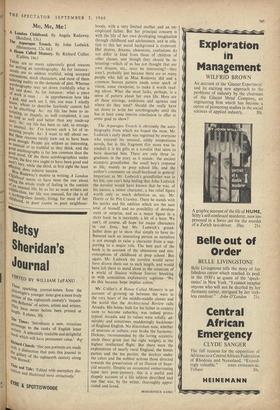Me, Me, Me !
A London Childhood. By Angela Rodaway. (Batsford, 15s.) THERE are so many apparently good reasons for writing an autobiography. As for instance: novels are so seldom truthful, using accepted conventions, stock characters, and most of them tailoring reality to the demands of plot. Whereas autobiography may set down truthfully what is felt and done. As for instance: what a piece of work is man . . . in apprehension how like a god, and such am I, this one man I wholly knoll',
to be Whom to describe fearlessly cannot fail terestinabsorbing. As: my life has been so in- g, so shapely, so well completed, it can
be told as well and better than any made-up story. As: my life has been so odd, so strange, so Unusual. As: I've known such a lot of in- teresting people. As: I want to tell about me. But these reasons rarely turn out to have been good enough. People are seldom as interesting, as unusual or as truthful as they think, and the goad autobiography is far less common than the good novel. Of the three autobiographies under review, the first two ought to have been good and eff t. very, while the third. at first sight the least
!e.tive, does achieve success.
Rodaway's motive in writing A London tecill•t°W seems to have been the one about of I - the whole truth of feeling in the context nia wail:en:sus al life. In so far as most writers are , her life was unusual, for she is of ebi,_?tkulg-class family, living, for most of her 4thnod• in poor rooms in poor neighbour- hoods, with a very limited mother and an un- employed father. But her principal concern is with the life of her own developing imagination through childhood and adolescence, and in rela- tion to this her social background is irrelevant. Her desires, dreams, obsessions, confusions do not differ in kind from those of children of other classes, and though they should be in- teresting—which of us has not thought that our own dreams, etc., must be interesting?—they aren't, probably just because there are so many people who felt as Miss Rodaway did and a common human pattern needs some spark of vision, some viewpoint, to make it worth read- ing about. What she most lacks, perhaps, is a sense of pattern about her own life. Here are all these stirrings, ambitions and agonies and where do they tend? Should she really have sat down to write her autobiography until she has at least some interim conclusion to offer or some goal to show?
The Asparagus Trench is obviously the auto- biography from which we hoped the most. Mr. Lodwick's early death was regretted by everyone who enjoyed his unusual, oddly tempestuous novels, but in this fragment (for more was in- tended) it is his gifts as a novelist that seem to have deserted him. There are only three in- gredients in the story as it stands: the ancient eccentric grandfather the small boy's response to life, mainly to prep school life, and the author's comments on small-boyhood in general. Important as Mr. Lodwick's grandfather was in his life, one can't help feeling that John Lodwick the novelist would have known that he was, of his nature, a minor character, a bas relief figure worth only as much definition as, say, Mr. Dorrit or Sir Pitt Crawley. There he stands with his quirks and his oddities which are the sum total of himself and no possibility of develop- ment or surprise, and as a major figure in a short book he is inevitably a bit of a bore. We can't, of course, all hope for major characters in our lives, but Mr. Lodwick's grand- father does go to show that simply to have in- fluenced such an interesting person as ourselves is not enough to raise a character from a sup- porting to a major role. The best part of the book is its account of the obsessions and mis- conceptions of childhood at prep school. But again, Mr. Lodwick the novelist would never have drawn them out to such length, and would have left them to stand alone as the creations of a world of illusion without forever breaking in with sententious explanatory captions—'We do this because hope implies action.'
Mr. Collier's A House Called Memory is an account of growing up between the wars in the very heart of the middle-middle classes and the world that the Architectural Review calls Arcadia. His home, built for his father in country soon to become suburbia, was indeed proto- typical Arcadia and its values were solidly, ad- mirably and sometimes maddeningly backbone- of-England English. No discordant note, whether of neurosis or culture, ever broke the harmony; Dickens, recommended by the loving eccentric uncle (here given just the right weight), is the highest intellectual flight. But there were the explorations of nearly rural England, the tennis parties and the tea parties, the doyleys under the cakes and the noblest actions those directed towards the preservation of an illusion of finan- cial security. Despite an occasional embarrassing lapse into peter-pannery, this is a useful and shapely account of a life seldom described and one that was, by the writer, thoroughly appreL ciated and loved.
MARGHANITA LASKI


































 Previous page
Previous page